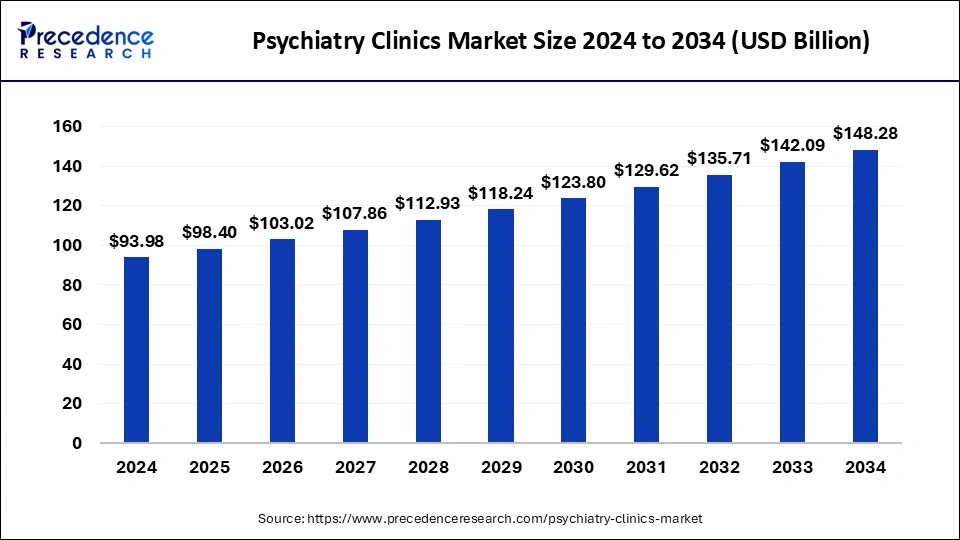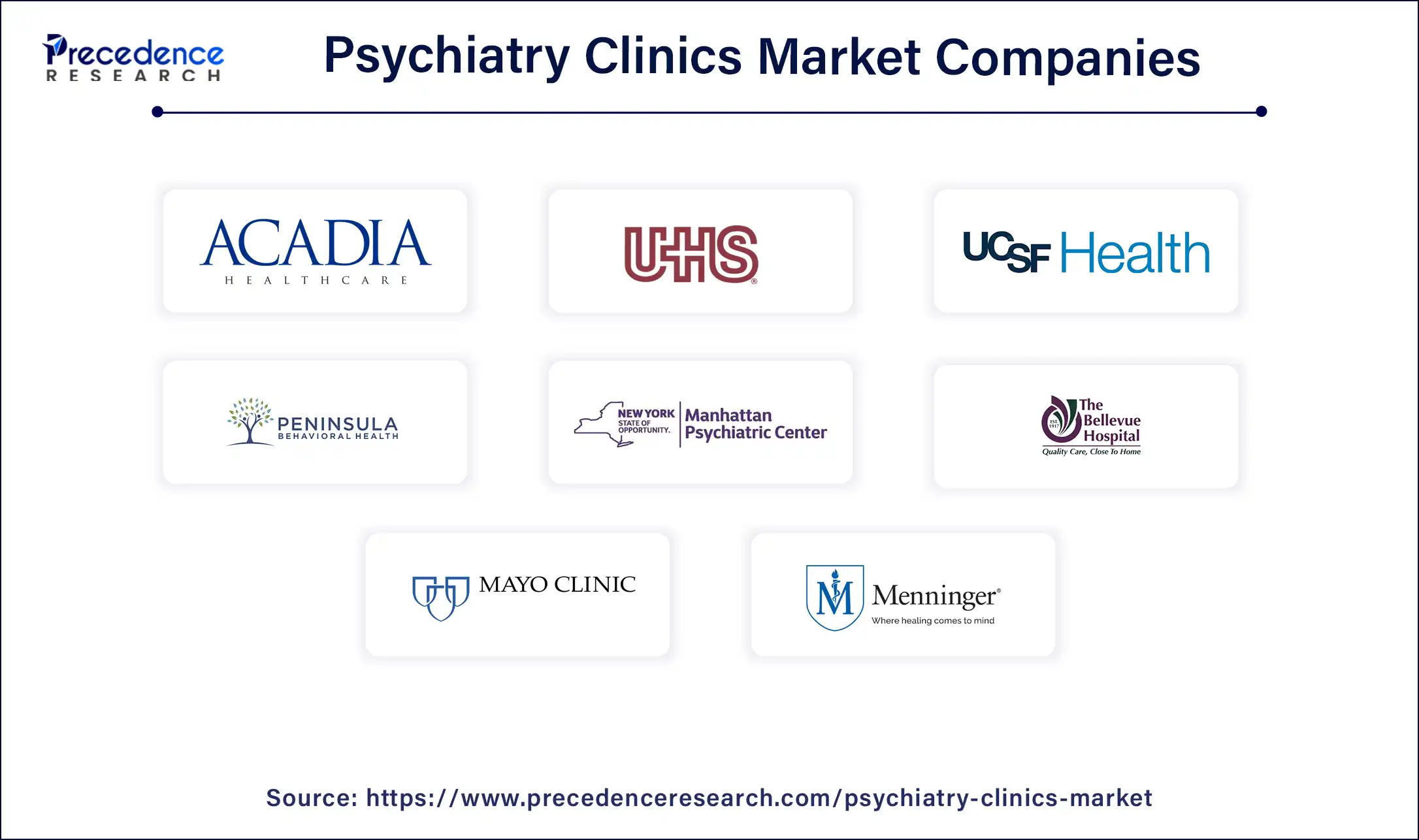October 2024
The global psychiatry clinics market size is calculated at USD 98.40 billion in 2025 and is forecasted to reach around USD 148.28 billion by 2034, accelerating at a CAGR of 4.67% from 2025 to 2034. The market sizing and forecasts are revenue-based (USD Million/Billion), with 2024 as the base year.
The global psychiatry clinics market size was estimated at USD 93.98 billion in 2024 and is predicted to increase from USD 98.40 billion in 2025 to approximately USD 148.28 billion by 2034, expanding at a CAGR of 4.67% from 2025 to 2034. The psychiatry clinics market is driven by the rising rates of mental illness.

The market for psychiatric clinics is a subset of the healthcare sector that focuses on offering specialist facilities for mental health treatments. These clinics specialize in the diagnosis, treatment, and management of a broad spectrum of mental health conditions, such as substance misuse, depression, anxiety, schizophrenia, and bipolar disorder. Psychiatric assessments, medication management, psychotherapy, counseling, and other mental health therapies are among the services that psychiatry clinics generally offer. These clinics range in size from modest individual offices to expansive, multidisciplinary facilities, and they can operate independently or as a component of larger healthcare systems.
The psychiatry clinics market makes a substantial contribution to the healthcare sector. It generates jobs and stimulates the economy by involving various professions, such as social workers, psychologists, psychiatrists, and administrative personnel. Clinics for psychiatry frequently participate in clinical trials and research, which advances the field of psychiatry and its therapeutic approaches. The goal of this research is to provide novel, more potent treatments for mental health issues.
| Report Coverage | Details |
| Market Size in 2025 | USD 98.40 Billion |
| Market Size by 2034 | USD 148.28 Billion |
| Growth Rate from 2025 to 2034 | CAGR of 4.67% |
| Largest Market | North America |
| Base Year | 2024 |
| Forecast Period | 2025 to 2034 |
| Regions Covered | North America, Europe, Asia-Pacific, Latin America, and Middle East & Africa |
Growing number of people diagnosed with mental health conditions
Around the world, there is an increase in the prevalence of mental health conditions such as schizophrenia, bipolar disorder, anxiety, and depression. The World Health Organization (WHO) reports that one of the leading causes of disability in the globe today is mental health disorders. Stress, alterations in lifestyle, social isolation, and financial strains are all responsible for this rise. Globally, governments and health organizations are realizing the significance of mental health more and more.
Psychiatric clinics have expanded, and new ones have been established due to increased financing and policies about mental health treatment. Initiatives to expand the number of mental health specialists in the workforce and enhance the infrastructure supporting mental health care have also been essential. This drives the psychiatry clinics market.
Mental health stigma can deter individuals from seeking psychiatric care
When people internalize societal ideas and accept unfavorable perceptions about themselves, it can lead to self-stigma. As a result, people may start to feel embarrassed of themselves or undeserving of help, which may lead to a negative self-image and discourage them from getting mental health treatment. A lack of motivation to seek therapy may result from thinking that their illness is a personal failing or that it will never get better.
Self-stigma can hinder people's participation and treatment adherence even when they seek therapy, which lessens the efficacy of the intervention.
Variability in licensing requirements across regions
Differential licensing regulations might lead to regional differences in the standard of care and services provided. While certain regions might have stricter laws guaranteeing top-notch treatment, others might have laxer rules that could jeopardize patient outcomes and safety. Patients may notice these variations and be reluctant to put their trust in clinics that operate in areas with laxer licensing regulations.
Integrating psychiatric services with primary care
A comprehensive approach to patient treatment is made possible by integrating mental health services with general care. Physical and mental health disorders often overlap, and treating both improves overall health results. Psychiatrists and primary care physicians can together develop treatment regimens that consider the patient's social, emotional, and physical health. Enhanced coordination and communication between healthcare providers are facilitated by the integration of psychiatric services with primary care. Coordinating care transitions, having regular case discussions, and sharing decision-making are made possible by this interdisciplinary approach.
Improved communication lowers fragmentation and enhances results, ensuring that every healthcare team member takes the same approach to patient care.
Advances in genetics and neuroscience are enabling more personalized treatment plans
Genetics has made significant insights into the inherited components of numerous mental health diseases possible. Different genetic investigations, including genome-wide association studies (GWAS), have allowed researchers to pinpoint genetic abnormalities linked to disorders like bipolar disorder, schizophrenia, depression, and others. With this knowledge, medical professionals can customize treatment programs according to a patient's genetic profile. For example, genetic variations may suggest a greater reaction to drugs or treatments, helping doctors choose each patient's best course of action. This is an opportunity for the growth of the psychiatry clinics market.
The adult segment dominated the psychiatry clinics market in 2024. More adults are using therapy and mental treatment without fear of stigma because of these services becoming more normative and broadly accepted in various countries. Large sums of money are invested in adult psychiatric research and development, which makes cutting-edge treatment choices available and draws more adults to clinics. Adults also deal with tensions in their personal lives, such as parenting difficulties, marital issues, and providing care for elderly parents. These elements may make mental health problems worse and increase the need for clinic appointments.
The pediatrics segment is expected to show a notable growth rate in the psychiatry clinics market during the forecast period. Parents, educators, and healthcare workers now have a far greater understanding of mental health difficulties in children. Better symptom recognition and early diagnosis have resulted from campaigns and educational programs, raising the demand for mental examination and therapy suited to younger populations. Children today experience mental health issues due to modern societal developments, such as increasing academic pressure, social media influence, and family relationships. The mental health industry must respond forcefully to these pressures, providing specialized pediatric psychiatric treatments, among other measures.
North America had its largest market share in 2024 in the psychiatry clinics market. In terms of innovative psychiatric research, North America is leading the way. This involves the creation of novel drugs, effective treatment methods, and digital health solutions such as telepsychiatry, which has grown in significance, particularly in the wake of the COVID-19 pandemic. The National Alliance on Mental Illness (NAMI) and campaigns like Mental Health Awareness Month have been instrumental in lowering the stigma associated with mental health conditions and promoting the use of psychiatric services by more people.
Psychiatric care is widely accessible in both the United States and Canada despite the structural differences between their healthcare systems. In the United States, insurance coverage frequently covers mental health services, even though it is mostly privatized. Many people in Canada have access to psychiatric care thanks to the country's public healthcare system.
Asia-Pacific is the fastest growing region in the psychiatry clinics market during the forecast period. Asia-Pacific is witnessing a discernible rise in the incidence of mental health conditions, such as anxiety, depression, and substance addiction disorders. Rapid societal development, cutthroat workplaces, and changing lifestyles contribute to this growth. The market for psychiatric clinics is growing due to the rising demand for mental examination, treatment, and continuous management brought on by this increased prevalence. The region has seen a notable rise in awareness of mental health issues in recent years. Governments, non-governmental organizations (NGOs), and media campaigns working to lessen the stigma attached to mental illness are somewhat to blame for this. The need for psychiatric treatments is growing as more people become aware of mental health issues.

By Age-group
By Geography
For inquiries regarding discounts, bulk purchases, or customization requests, please contact us at sales@precedenceresearch.com
No cookie-cutter, only authentic analysis – take the 1st step to become a Precedence Research client
October 2024
July 2024
October 2024
January 2024